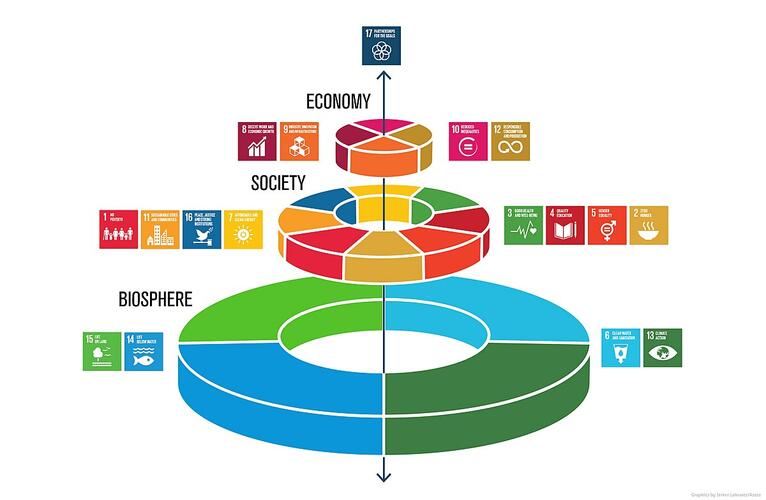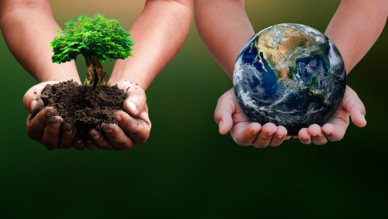Sustainability at the Europäische Akademie Otzenhausen means...
For us, sustainability or sustainable development means behaving and acting in such a way that future generations will still have a future worth living. Sustainability is a very complex topic in the context of various different realities of life as well as different research areas and traditions.
The German Federal Ministry for the Environment, Nature Conservation, Nuclear Safety and Consumer Protection (as of 08.12.2022) sums it up well:
"In the here and now, people should not live at the expense of fellow human beings in other regions of the earth and at the expense of future generations.
Sustainability affects all areas of our lives and economies and is therefore a task for society as a whole. The guiding principle calls for a development of our society that is ecologically compatible, socially just and economically efficient.
The four fundamental aspects of sustainability
Our understanding of sustainability and sustainable development is based on four fundamental aspects:
- the three dimensions of sustainability
- the 17 Sustainable Development Goals (SDGs)
- the interplay of different approaches
- and the overarching goal of a Global Transformation.
The three dimensions of sustainability
The concept of "sustainability" comprises three dimensions: the ecological, the economic and the social. There are different opinions as to whether all three dimensions should be treated equally or whether the interdependencies between the three aspects should be taken into account in the weighting. This is based on the consideration that without a functioning ecological balance (ecology) there can be no society (social) and without society there can be no economy (economy).
The EAO's approach is that the ecological dimension and the planetary boundaries of the Earth are prerequisites for a functioning society and a flourishing economy.
The 17 Sustainable Development Goals (SDGs)
The 17 Sustainable Development Goals (SDGs) were adopted by the Unied Nations as part of Agenda 2030. They bring these three dimensions to life and therefore form the basis of our work.
- More information as well as a list of the goals: https://sdgs.un.org/goals
- & a short video: https://www.youtube.com/watch?v=M-iJM02m_Hg
The Europäische Akademie Otzenhausen considers the Sustainable Development Goals both in its educational offers and as a company. We have identified seven SDGs to which we can contribute, in particular.
You can also find more information about the SDGs and how they relate to each other here: The SDGs Wedding Cake and on the figure to the right.
(Source: Azote for Stockholm Resilience Centre, Stockholm University CC BY-ND 3.0)
The interplay of different solutions
There are various solutions and research approaches that aim to implement the goals. At the EAO, we are open to and combine different approaches in our work.
In the area of ecology, possible solutions are quite diverse; both nature-based (e.g., protection and reforestation of forests, protection and rewetting of moors) and technical approaches (e.g., renewable energies, green IT) are pursued in research. The social dimension of sustainable development aims to improve the quality of life for current and future generations (e.g. improving the health and education systems).
In the area of economy, the keyword circular economy as well as terms like resource management / material flow management often come up. This goes back to the idea that materials and resources are finite and that we should therefore use them as little as possible and at the same time for as long as possible. In addition, efforts are often made to reduce individual demand, either by changing attitudes (e.g. eating vegetarian or vegan more often) and/or by developing business models that involve reducing demand (e.g. developing meat alternatives)
The overarching goal: Global transformation
On a global scale, the goal of all these considerations and solutions must be a change of mindset and a systemic transformation to achieve a more sustainable future. One nation alone cannot make sufficient changes to make the future of all generations, present and future, globally sustainable and secure. The SDGs, and thus a future worth living, can only be achieved by all nations working together to change behavior.
Therefore, we can also use our expertise in the field of political education with a focus on intercultural encounters to contribute to achieving the goals.


